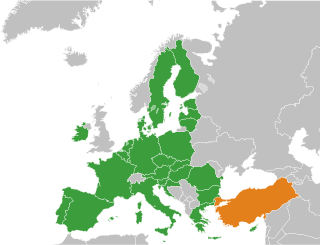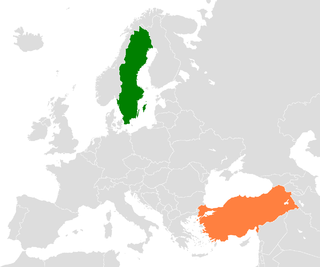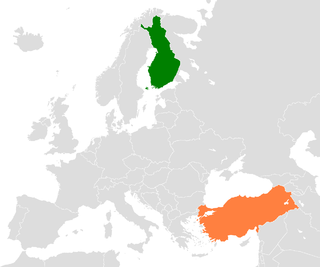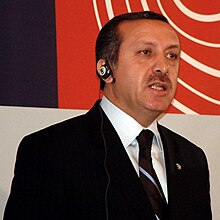
Recep Tayyip Erdoğan is a Turkish politician who is the 12th and current president of Turkey since 2014. He previously served as the 25th prime minister from 2003 to 2014 as part of the Justice and Development Party (AKP), which he co-founded in 2001. He also served as mayor of Istanbul from 1994 to 1998.

A referendum on the Annan Plan was held in the Republic of Cyprus and the Turkish Republic of Northern Cyprus on 24 April 2004. The two communities were asked whether they approved of the fifth revision of the United Nations proposal for reuniting the island, which had been divided since 1974. While it was approved by 65% of Turkish Cypriots, it was rejected by 76% of Greek Cypriots. Turnout for the referendum was high at 89% among Greek Cypriots and 87% among Turkish Cypriots, which was taken as indicative of great interest in the issue on the part of the electorates.

Abdullah Gül is a Turkish politician who served as the 11th president of Turkey from 2007 to 2014. He previously served for four months as Prime Minister from 2002 to 2003, and concurrently served as both Deputy Prime Minister and as Foreign Minister between 2003 and 2007. He is currently a member of the Advisory Panel for the President of the Islamic Development Bank.

Turkey is negotiating its accession to the European Union (EU) as a member state, following its application to become a full member of the European Economic Community (EEC), the predecessor of the EU, on 14 April 1987.

Ahmet Davutoğlu is a Turkish academic, politician and former diplomat who served as the 26th Prime Minister of Turkey and Leader of the Justice and Development Party (AKP) from 2014 to 2016. He previously served as Minister of Foreign Affairs from 2009 to 2014 and chief advisor to Prime Minister Recep Tayyip Erdoğan from 2003 to 2009. He was elected as an AKP Member of Parliament for Konya in the 2011 general election and was reelected as an MP in both the June and November 2015 general elections. He resigned as prime minister on 22 May 2016.

German–Turkish relations have their beginnings in the times of the Ottoman Empire and they have culminated in the development of strong bonds with many facets that include economic, military, cultural and social relations. With Turkey as a candidate for the European Union, of which Germany is the largest member, and the existence of a significant Turkish diaspora in Germany, these relations have become more and more intertwined over the decades. Relations with Turkey significantly deteriorated after the 2016–17 Turkish purges including the arrest of journalists such as Die Welt's Deniz Yücel. Both countries are members of the Council of Europe and NATO. Germany opposes Turkey's European Union membership. Germany has an embassy in Ankara and a consulate-general in Istanbul, and Turkey has an embassy in Berlin.

Swedish–Turkish relations are foreign relations between Sweden and Turkey. Both countries are full members of the Council of Europe, NATO, the Organisation for Economic Co-operation and Development (OECD), the Organization for Security and Co-operation in Europe (OSCE) and the Union for the Mediterranean.

The nations of Mexico and Turkey established diplomatic relations in 1928. Both nations are members of the G20, OECD and the United Nations.

Finland–Turkey relations are foreign relations between Finland and Turkey. Finland has an embassy in Ankara and an honorary consulate general in Istanbul. Turkey has an embassy in Helsinki. Both countries are full members of the Council of Europe, the Organisation for Economic Co-operation and Development (OECD), the Organization for Security and Co-operation in Europe (OSCE), North Atlantic Treaty Organization (NATO), and the Union for the Mediterranean. Also Finland is an EU member and Turkey is an EU candidate. Turkey did not support Finland's accession to NATO until March 2023, but accepted its participation.

Dutch–Turkish relations are the bilateral relations between the Netherlands and Turkey. The diplomatic relations widely encompass and span four centuries, beginning in 1612. The first Turkish representative in the Netherlands started activities in 1859.

Mevlüt Çavuşoğlu is a Turkish diplomat and politician who is currently a member of the Grand National Assembly. He also served as the Minister of Foreign Affairs of Turkey from August 2014 to August 2015, and again from 24 November 2015 to 6 June 2023.

A constitutional referendum on a number of changes to the constitution was held in Turkey on 12 September 2010. The results showed the majority supported the constitutional amendments, with 58% in favour and 42% against. The changes were aimed at bringing the constitution into compliance with European Union standards. Supporters of Turkish EU membership hope constitutional reform will facilitate the membership process.

General elections were held in Turkey on 12 June 2011 to elect the 550 members of Grand National Assembly. In accordance to the result of the constitutional referendum held in 2007, the elections were held four years after the previous elections in 2007 instead of five.

The foreign policy of the Recep Tayyip Erdoğan government concerns the policy initiatives made by Turkey towards other states under Recep Tayyip Erdoğan during his tenure as prime minister from 2003 to 2014.

Hakan Fidan is a Turkish politician currently serving as the Minister of Foreign Affairs since June 2023. He was previously the director of the National Intelligence Organization (MİT) from March 2010 until June 2023.

The Ministry of European Union Affairs was a ministry of the Turkish government responsible for the accession process between the Republic of Turkey and the European Union. Formed on June 29, 2011 after Prime Minister Recep Tayyip Erdoğan won a third term in the 2011 general election. The ministry was responsible for co-ordinating negotiations and accession projects throughout the 81 provinces of Turkey to develop relations between Turkey and the European Union. The minister responsible concurrently served as the chief negotiator during the accession process. The Minister concurrently served as the chief negotiator during accession talks with the EU.

Hatice Beril Dedeoğlu was a Turkish academic who served as the Minister of European Union Affairs in the interim election government led by Prime Minister Ahmet Davutoğlu between 22 September and 17 November 2015. Having taken over from the previous interim cabinet minister Ali Haydar Konca following his resignation, Dedeoğlu served until Davutoğlu formed a new government after the November 2015 snap general election. She was, as required by the Constitution, of no political affiliation and was one of two women to serve in the interim cabinet, the other being Family and Social Policy Minister Ayşen Gürcan.

The Chief Negotiator for Turkish Accession to the European Union was the most senior official representing the Republic of Turkey during the country's accession negotiations to the European Union. The position was established on 17 January 2005 by Prime Minister Recep Tayyip Erdoğan. Following the establishment of the Ministry of European Union Affairs on 29 June 2011, the Minister of European Union Affairs was usually appointed concurrently to serve as the Chief Negotiator. The last Chief Negotiator was the EU Affairs Minister Ömer Çelik, in office between 2016–2018.

In March 2017, the Netherlands and Turkey were involved in a diplomatic incident, triggered by Turkish efforts to hold political rallies on Dutch territory and subsequent travel restrictions placed by Dutch authorities on Turkish officials seeking to promote the campaign for a 'yes' vote in the upcoming Turkish constitutional referendum to Turkish citizens living in the Netherlands. Such foreign campaigning is illegal under Turkish law.

The public image of Recep Tayyip Erdoğan concerns the image of Recep Tayyip Erdoğan, current President of Turkey, among residents of Turkey and worldwide.




































